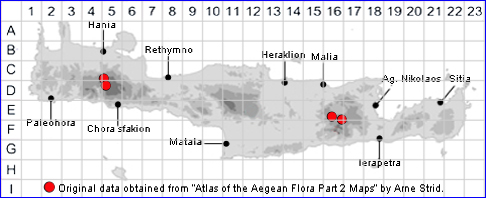
SPECIES DESCRIPTION
ALYSSUM LASSITICUM
Family and Genus:- See- CRUCIFERAE/Sect. ALYSSUM
Common Name:- None
Homotypic Synonyms:- None
Meaning:- Alyssum (Gr) Pacifier, ancient Greek name meaning without-fury -
alluding to the supposed medicinal properties against rabies.
Lassiticum (L) From the Lassithi area of E Crete.
General description:- Dwarf, suffruticose, whitish-grey, procumbent perennial.
Stems:-
1) Flowering, 5-10 cm, non-flowering with a terminal rosette of leaves.
Leaves:-
1) Densely covered on both sides with 20-24-rayed, sublepidote stellate hairs.
a) basal, obovate, acute.
b) cauline, linear-oblanceolate to obovate, obtuse.
Flowers:-
3) Raceme, short and dense in fruit.
4) Pedicels, 4·5-6·5 mm, erecto-patent, with dimorphic indumentum.
5) Sepals, 45 mm.
6) Petals, 6 mm, entire.
Fruit:-
1) Silicula, 6-7 mm, orbicular, obtuse or truncate, densely pubescent.
2) Valves, inflated.
3) Style, 3·5-4 mm.
4) Seeds, 2·5 mm, orbicular, narrowly winged.
Key features:-
1) Perennial, up to 40(-60) cm;
2) Middle cauline, leaves usually less than 10 mm wide, the hairs 8- to many-rayed.
3) Raceme, short and dense in fruit.
4) Petals, entire.
5) Silicula, without flattened margin.
6) Seeds, 2·5 mm, narrowly winged.
Habitat:- Crevices of limestone cliffs, rocky outcrops, 1700-2000 m,
Distribution:- Previously believed to be endemic to Mt Dikti, where it was first
collected by Baldacci in 1899; recently reported also from two localities close to
each other in Lefka Ori.
Flowering time:- May to early July.
Photo by:- Currently none available
